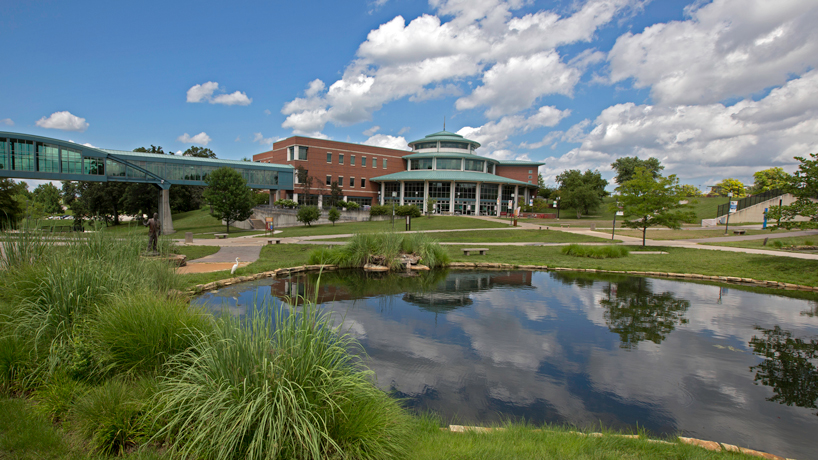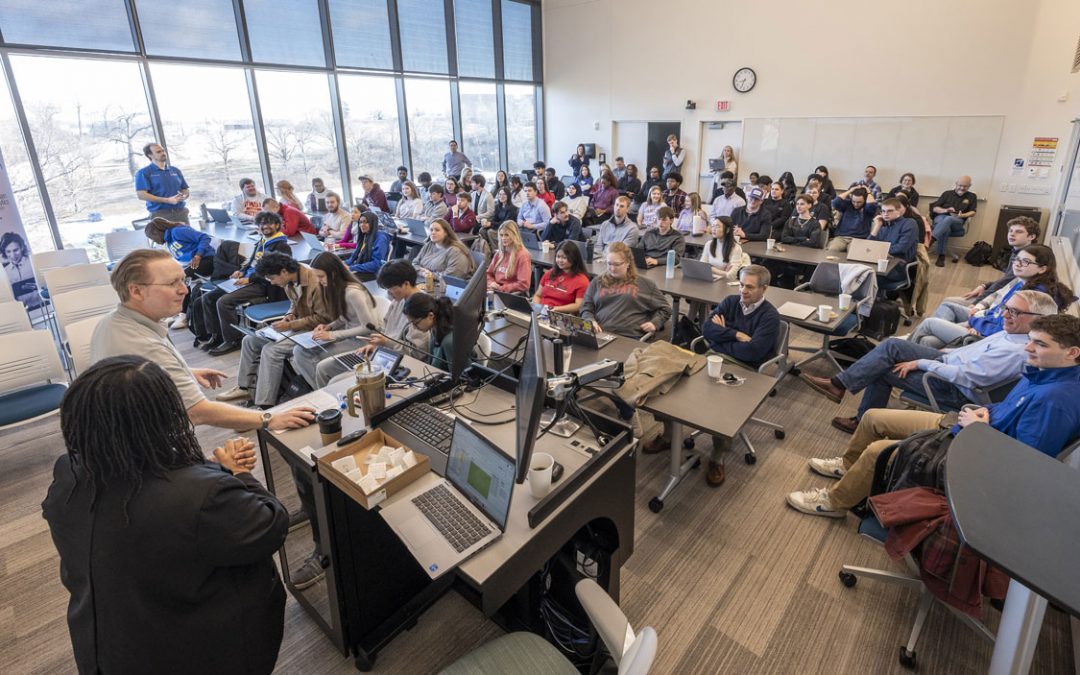
Undergraduate Research Day, sponsored by the University of Missouri System, gives 13 UMSL students the chance to present their research to state legislators virtually. (Photo by August Jennewein)
Next week, 13 University of Missouri–St. Louis undergraduate students will present their work virtually to state legislators at Undergraduate Research Day, which will actually span the week of April 12.
The event, sponsored by the University of Missouri System, is an opportunity for 49 students from the system’s four universities to share their research with Missouri lawmakers, showcasing the synergy between students and faculty at UMSL, the University of Missouri–Columbia, the University of Missouri–Kansas City and Missouri University of Science and Technology in Rolla.
“At the University of Missouri System, we understand that an important part of our role as Missouri’s only public research university is to help our students develop key life skills, such as critical thinking, logical problem-solving and tenacity,” UM System President Mun Choi wrote in a letter to legislators. “Undergraduate research allows students to build these skills as they work alongside our talented faculty and graduate students to conduct cutting-edge research at our four universities. These experiences, ranging from laboratory science to medicine to the humanities, help prepare our students for bright futures as thought leaders in the workforce. Setting our students up for success is central to our commitment to serving the interests of our state and the nation.”
UMSL’s 13 representatives come from a variety of departments including: anthropology, biology, chemistry, education, nursing, physics and psychological sciences.
Abigail Anderson, nursing; and Kairah Jones, nursing: “Chlorhexidine Gluconate Bathing & Its Effect on Central Line-Associated Bloodstream Infection (CLABSIs)”
Faculty mentor: Alicia Hutchings
Anderson and Jones tackled the issue of central line-associated bloodstream infections, a common health care-associated infection. After reviewing data on the use of Chlorhexidine gluconate an antimicrobial agent, in bathing, she found CHG baths reduced the infection rate of CLABSIs and also reduce colonization of bacteria that cause infections Vancomycin-resistant Enterococcus and Methicillin-Staphylococcus aureus.
Madison Beirne, education: “A Velvet Rope of Exclusion: The Delmar Divide”
Faculty mentor: Gerianne Friedline
While much research has been done on the topic of segregation in the St. Louis, Beirne investigated what it meant for education in the region. Her report studied the root causes of the Delmar Divide to understand how it disadvantaged students of color compared to their white counterparts.
Anne Brown, psychology and anthropology: “Positive Campus Climate Buffers the Effects of Classroom Gender Salience on Science Devaluing”
Faculty mentor: Bettina Casad
Brown’s research examined threatening educational environments for women in STEM majors, using survey data from students at a Midwestern university. The survey showed greater classroom gender disparities predicted devaluing behavior, but a positive campus climate for women seemed to mitigate that devaluing behavior.
Jessica Doshi, chemistry: “Curcumin: A Key to Fight Sepsis”
Faculty mentor: Eike Bauer
Doshi is working on new methods to synthesize carbohydrates, which have uses in vaccines and other pharmaceuticals. She will build on previous research to synthesize curcumin, which has the ability to fight sepsis.
Elise Elking, nursing; Isabella Kudanovych, nursing; Bridget Sheriden, nursing; and Emma Stevenson, biology: “The Interprofessional Management of Concussions in the School Setting”
Faculty mentor: April Sun
Elking, Kudanovych, Sheriden and Stevenson reviewed existing research on concussion protocols in schools to identify a more effective model. They found a need to educate all school stakeholders about signs and symptoms, preventative measures and long-term effects so students are more likely to self-report.
Will McConnell, biochemistry and biotechnology: “Computer Aided Development of Fluorescent Dyes”
Faculty mentor: Cynthia Dupureur
McConnell studied the fluorescent properties of newly synthesized dyes whose structures can be modified. The environmentally sensitive dyes have broad applications in biomedical and cell research by highlighting changes to the micro-environment of a cell. He then used a simulation software to predict attributes of potential compounds, decreasing time spent to identify viable dyes.
Marlie Mollett, physics: “AI Gravity Project”
Faculty mentor: Dawn King
The National Geospatial-Intelligence Agency maintains high-resolution gravity maps for such uses as inertial navigation systems and earthquake detection. Mollett’s research involved developing a higher-resolution gravity map utilizing high-performance computing power to build an AI-gravity prediction tool for areas of the globe where gravity data is difficult to obtain.
Christopher Vance, psychology: “Grit & Resilience: Foundations for Mindset Differences Between Adult Children of Alcoholics and Adult Children of Non-Alcoholics”
Faculty mentor: Jodi Woodruff
Vance looked at the unique challenges children of alcoholic parents face and whether their experiences lead to resilience later in life. He surveyed the adult children of alcoholics and non-alcoholics and found data to support the idea that those who live with a parent with alcoholism have lower levels of grit and resilience.
Carol Welch, chemistry: “Spectral Analysis of Platinum Fluoride”
Faculty mentor: Jim O’Brien and Leah O’Brien (SIUE)
Welch’s research examines a new electronic transition of platinum fluoride that was recorded at high resolution using intracavity laser spectroscopy. Rotational assignments for the transitions were confirmed through combinational difference analysis using known ground state constants.
For more information on Undergraduate Research Day, visit: www.umsystem.edu/ums/red/undergraduate_research_day














